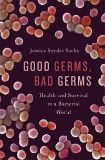 Balance is a tricky thing to find in area, and medicine is notorious for its trade-offs. A drug that may make you well in the long run may also have side effects that make taking the medicine difficult. Even drugs that we often think of as typically innocuous, such as antibiotics, can have an enormous cost associated with their use, both at the individual and the population level. Sachs covers our love-hate relationship with antibiotics and germs in general in her book, Good Germs, Bad Germs. More after the jump...
Balance is a tricky thing to find in area, and medicine is notorious for its trade-offs. A drug that may make you well in the long run may also have side effects that make taking the medicine difficult. Even drugs that we often think of as typically innocuous, such as antibiotics, can have an enormous cost associated with their use, both at the individual and the population level. Sachs covers our love-hate relationship with antibiotics and germs in general in her book, Good Germs, Bad Germs. More after the jump...
Sachs opens her book with a dramatic example of the cost of our "war" with microbes: the tragic story of a young college football player whose life was cut short due to an infection with methicillin-resistant Staphylococcus aureus (MRSA). The generation and spread of this "superbug" stems largely from our abuse of antibiotics, both in human medicine and in agriculture (topics which Sachs fleshes out in later chapters of the book).
While Sachs provides an excellent overview of the generation of these various "bad germs" via our overuse of antibiotics, this is an area that many readers will probably be at least somewhat familiar with, as it's been more frequently covered in prior books and articles. Therefore, what really makes this book stand out is Sachs' discussion of the "hygiene hypothesis" and the rest of the "good germs" portion of her book--and how antibiotic use can not only lead to antibiotic resistance, but potentially to a host of other chronic diseases in those who receive antibiotics frequently. She carefully covers the current research investigating links between asthma, allergy, autoimmune diseases and our "normal flora"--the bacteria that harmlessly colonize us, providing us with nutrients, taking up space that may otherwise be filled by pathogens, and even priming and training our immune system responses.
Sachs describes novel research trying to reverse the symptoms of some diseases thought to have an autoimmune component, such as research done here at the University of Iowa using pig whipworm eggs to treat Crohn's disease and ulcerative colitis. She also investigates other unusual therapies, including bacteriophages to combat the "superbugs" we've cultivated, and even the potential to use Mycobacterial extracts as cancer-fighting agents. The potential to better understand, and even harvest, these "good germs" for our use in human medicine has wide implications that we're only just beginning to understand--and the implications will only broaden as we delve deeper into the human metagenome.
Overall, Sachs has written an entertaining and well-researched volume covering the spectrum of our interaction with the invisible world around (and within) all of us--how they both help and harm us, and how we can work to find a balance between the two. This is one of the microbiology books that everyone should read.
- Log in to post comments

Balance is a tricky thing to find in [any?] area, and medicine is notorious for its trade-offs.
I think Summer reading lists should come in a close second.
Thanks so much for the positive feedback. I will be sure to link to your site from my website next time I'm at a high-speed connection. (Writing this from a cabin in the woods with a VERY pokey dial-up.)
Meanwhile, I'd be more than happy to field any questions from you and your readers. The best way to reach me is probably through the feedback page of my website: www.jessicasachs.com.
Thanks again and best wishes,
Jessica (Snyder Sachs)
Not shocking, though it should be. I have heard a great deal of racist, ignorant commentary about Obama's name and skin color from people who are striving to attack anything they can.
While I'd thought attitudes like that had gone the way of the dodo, apparently not, and at least these people are revealing themselves as they truly are.
I do agree that they just won't listen to facts. They have their mind set and that's that. Nothing will get through.
Hi
you have provided wonderful information...people think germs are only meant to be harmful....this info is eye opening...awesome...
I agree, this is a great book.
thanks for all